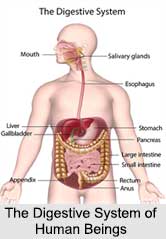 Digestive Organs perform different functions and these are the stomach, pancreas and liver. How much people chew and the pH acidity of their foods are the first effectors of digestion. The "enzyme ptyalin" needs a slightly alkaline environment to carry out its task of breaking down starch. Digestion starts as soon as an individual take the first bite of a meal.
Digestive Organs perform different functions and these are the stomach, pancreas and liver. How much people chew and the pH acidity of their foods are the first effectors of digestion. The "enzyme ptyalin" needs a slightly alkaline environment to carry out its task of breaking down starch. Digestion starts as soon as an individual take the first bite of a meal.
Chewing in Digestion
Chewing provides important signals which begin "peristalsis" (peristalsis is a series of wave-like muscle contractions that moves food to different processing stations in the digestive system). If an individual has a desire for eating on the run, chewing is lost due to the hurry. Eating in a relax mood excites the smooth muscles of the stomach which develops the blood flow of the digestive organs, which stimulates the digestive juices and "agni". Chewing breaks the food into pieces for easy digestion, while saliva mixes with the food to start the process of breaking it down into a form, so that an individual"s body can take it in easily.
Role of Stomach in Digestion
The stomach is a major organ of digestion, as well as the general purifier of consuming foods. Hydrochloric acid is the one sign of "agni" breaks down the protein and also kills bacteria with other microorganisms. The people, who try to obstruct the natural function of "agni" by taking antacids, have been found to have difficulties in digestion more. The herb "quassia" is helpful or lemon or "umeboshi plum" is helpful in this case. Stomach also has an accurate discharge of acid in reaction to different proteins. It secretes more acid at different times, depending on the protein of the eaten food.
Ayurvedic sages recommended centuries ago not to eat fish and dairy together. They are best digested when taken alone. The main route of stomach is the small intestine to large intestine. The small intestine is responsible for both producing enzymes to digest carbohydrates, fats, and proteins, integrating the enzymes. In Ayurveda, it is said that the small intestine is the organ which is most affected by overeating. Like the "Pitta" energy, the small intestine takes a leading role in digestion and excess food can damage this initiation strikingly, causing slow and backed-up digestion. The stomach secretes acid and powerful enzymes that continue the process of breaking down the food.
Role of Pancreas in Digestion
The pancreas retains the essential supporting roles in digestion process. The pancreas produces abundant amounts of bicarbonate (an intermediate form in the deprotonation of carbonic acid.) to alkalize, the acidic secretions dripping into the small intestine from the stomach. This enables the pH-sensitive enzymes of the upper small intestine (the duodenum) to do their catabolic work. The pancreas also creates enzymes to digest fats, proteins and carbohydrates. Often a craving for sweets will indicate a need to balance the pancreas through additional chromium, zinc, or protein snacks. Protein is a primary fuel by which digestive enzymes in both the small intestine and pancreas are made. Gradually increasing protein eating in the form of simply digested foods such as "khichdi", "miso broth", "clear chicken broth" or a bit of "blue-green algae" generally build up a strong digestion process.
Role of Liver in Digestion
The liver carries out a lot of roles. In digestion, it particularly produces "bile" (contains bile acids, which are vital for digestion and absorption of fat vitamins in the small intestine). In "hepatitis", the liver`s energy becomes very low so digestion is distressed. Unprocessed "bile", usually excreted through the feces (Urine and feces together are called excreta which is discharged through the elimination) backs up into the bloodstream. This creates the yellow skin, brown urine and light stools familiar to those who have had "hepatitis". The bile pigments show up in the skin and urine. If seeds of weeds (ill health) are present, excesses of diet or lifestyle can help them "sprout." A way to keep away from developing illness is not to supply it, in this case not to eat high-fat, high-sugar or low-fibre foods. Such diets create problems not only in the liver but the colon as well.
It has been said that high-fibre or low-fat diets help in being the healthiest and most cancer-free colons, such systems allow the colon to keep itself clean and not burdened with extra mucus or poor bacteria. Potassium must be effectively absorbed through the colon, the seat of "Vata", before it can support calcium in the bones, another "Vata" realm. As per the Ayurveda, the colon must be clear and strong for the bones to be strong. Excess mucus and bacteria damage these functions and misbalancing "Vata" and inhibiting elimination. Elimination is the means by which we let go of any unneeded elements, digested and not. When "Vata" is balanced, elimination happens easily. When it is not, then "diarrhoea ", "constipation", gas or dry stools can be the result.





